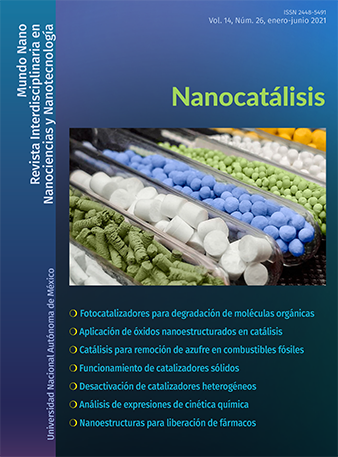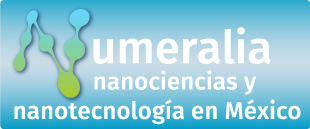Desarrollo de fotocatalizadores basados en TiO2 en forma de película delgada para la degradación de moléculas orgánicas en solución acuosa
Resumen
El TiO2 se utiliza en una amplia variedad de aplicaciones, entre ellas la fotocatálisis en el área ambiental para autolimpieza de superficies y purificación de aire y agua. Con el propósito de desarrollar nuevos materiales con mejor respuesta fotocatalítica usando luz solar, se ha propuesto modificar el TiO2 siguiendo diversas estrategias. En este trabajo, se resumen los aspectos básicos de la fotocatálisis discutiéndose las ventajas de utilizar fotocatalizadores en forma de película delgada. Se presenta como caso de estudio la obtención de películas delgadas de TiO2 modificadas con zinc, utilizando una ruta de síntesis novedosa que permite buen control en la composición y estructura de los materiales obtenidos. Se muestran los resultados obtenidos en la evaluación fotocatalítica de las películas en la reacción de degradación del colorante verde de Malaquita, observándose algunas ventajas.
Citas
Abad, J.; C. Gonzalez, P. L. de Andres, E. Roman. (2010). Characterization of thin silicon overlayers on rutile TiO2(110)-(1x1). Phys. Rev. B, 82: 165420. https://doi.org/10.1103/PhysRevB.82.165420
Alderman, D. J. (1985). Malachite green: A review. Journal of fish diseases, 8: 289-298. https://doi.org/10.1111/j.1365-2761.1985.tb00945.x
Bare, S. R.; Griffiths K., Lennard W. N., Tang H. T. (1995). Generation of atomic oxygen on Ag(111) and Ag(110) using NO2: a TPD, LEED, HREELS, XPS and NRA study. Surf. Sci., 342: 185-198. https://doi.org/10.1016/0039-6028(95)00670-2
Budigi, Lokesh; Madhusudhana Rao Nasina, Kaleemulla Shaik, Sivakumar Amaravadi. (2015). Structural and optical properties of zinc titanates synthesized by precipitation method. J. Chem. Sci., 127: 509-518. https://doi.org/10.1007/s12039-015-0802-5
Cabrera, María I.; Alfano Orlando M., Cassano Alberto E. (1996). Absorption and scattering coefficients of titanium dioxide particulate suspensions in water. J. Phys. Chem., 100: 20043-20050. https://doi.org/10.1021/jp962095q
Colón, G.; M. Maicu, M. C. Hidalgo, J. A. Navío. (2006). Cu-doped TiO2 systems with improved photocatalytic activity. Applied Catalysis B: Environmental, 67(1-2): 41-51. https://doi.org/10.1016/j.apcatb.2006.03.019
Deng, Y.; Zhao, R. (2015). Advanced oxidation processes (AOPs) in wastewater treatment. Curr Pollution Rep.,1: 167-176. https://doi.org/10.1007/s40726-015-0015-z
Di Paola, Agatino; Bellardita Marianna, Palmisano Leonardo. (2013). Brookite, the least known TiO2 photocatalyst. Catalysts, 3: 36-73. https://doi.org/10.3390/catal3010036
Eason, Robert (ed.). (2006). Pulsed laser deposition of thin films: Applications‐led growth of functional materials. EUA: John Wiley & Sons, Inc.
Escobedo, João F.; Eduardo N. Gomes, Amauri P. Oliveira, Jacyra Soares. (2011). Ratios of UV, PAR and NIR components to global solar radiation measured at Botucatu site in Brazil, Renew. Energ., 36: 169-178. https://doi.org/10.1016/j.renene.2010.06.018
Fernandez, I.; Cremades A., Piqueras J. (2005). Cathodoluminescence study of defects in deformed (110) and (100) surfaces of TiO2 single crystals. Semicond. Sci. Technol., 20: 239. https://doi.org/10.1088/0268-1242/20/2/024
Gavrilescu, Maria; Katerina Demnerova, Jens Aamand, Spiros Agathos, Fabio Fava. (2015). Emerging pollutants in the environment: present and future challenges in biomonitoring, ecological risks and bioremediation. New Biotechnology, 32 (1): 147-156. https://doi.org/10.1016/j.nbt.2014.01.001
Glaze, William H., Kang Joon-Wun, Chapin Douglas H. (1987). The chemistry of water treatment processes involving ozone, hydrogen peroxide and ultraviolet radiation. Ozone Science and Engineering, 9: 335-352. https://doi.org/10.1080/01919518708552148
Gleick, Peter H. (2002). Dirty water: Estimated deaths from water-related diseases 2000-2020. Pacific Institute Research Report.
González-Zavala, F.; L. Escobar-Alarcón, D. A. Solís-Casados, S. Romero, M. Fernández, E. Haro-Poniatowski, E. Rodríguez-Castellón. (2018). Synthesis and characterization of silver vanadates thin films for photocatalytic applications. Catalysis Today, 305:102-107. https://doi.org/10.1016/j.cattod.2017.09.007
Han, Fang; Venkata Subba Rao Kambala, Madapusi Srinivasan, Dharmarajan Rajarathnam, Ravi Naidu. (2009). Tailored titanium dioxide photocatalysts for the degradation of organic dyes in wastewater treatment: A review. Applied Catalysis A: General, 359: 25-40. https://doi.org/10.1016/j.apcata.2009.02.043
Haro-Poniatowski, E.; Rodríguez Talavera R., De la Cruz Heredia M, Cano-Corona O. y Arroyo-Murillo. (1994). Crystallization of nanosized titania particles prepared by the sol-gel process. J. Mater. Res. 9: 2102. https://doi.org/10.1557/JMR.1994.2102
Hashimoto, K.; H. Irie, A. Fujishima. (2005). TiO2 photocatalysis: A historical overview and future prospects. Jpn. J. Appl. Phys., 44: 8269-8285. https://doi.org/10.1143/JJAP.44.8269
Hwang Yun Jeong; Hahn Chris, Liu Bin, Yang Peidong. (2012). Photoelectrochemical properties of TiO2 nanowire arrays: A study of the dependence on length and atomic layer deposition coating. ACS Nano, 6 (6): 5060-5069. https://doi.org/10.1021/nn300679d
Jing, L. Q., X. J. Sun, B. F. Xin, W. M. Cai, H. G. Fu. (2004). The preparation and characterization of La doped TiO2 nanoparticles and their photocatalytic activity. J. Solid State Chem., 177: 3375-3382. https://doi.org/10.1016/j.jssc.2004.05.064
Lellis, Bruno; Cíntia Zani Fávaro-Polonio, João Alencar Pamphile, Julio Cesar Polonio. (2019). Effects of textile dyes on health and the environment and bioremediation potential of living organisms. Biotechnology Research and Innovation, 3: 275-290. https://doi.org/10.1016/j.biori.2019.09.001
Marcoux, M. -A.; M. Matias, F. Olivier, G. Keck. (2013). Review and prospect of emerging contaminants in waste and challenges linked to their presence in waste treatment schemes: General aspects and focus on nanoparticles. Waste Management, 33 (11): 2147-2156. https://doi.org/10.1016/j.wasman.2013.06.022
Ohtani, B.; Prieto-Mahaney O. O., Li D., Abe R. (2010). What is Degussa (Evonik) P25? Crystalline composition analysis, reconstruction from isolated pure particles and photocatalytic activity test. Journal of Photochemistry and Photobiology A: Chemistry, 216: 179-182. https://doi.org/10.1016/j.jphotochem.2010.07.024
Phani, A. R.; M. Passacantando, S. Santucci. (2007). Synthesis of nanocrystalline ZnTiO3 perovskite thin films by sol–gel process assisted by microwave irradiation. Journal of Physics and Chemistry of Solids, 68: 317. https://doi.org/10.1016/j.jpcs.2006.09.010
Rehman, Shama; Ruh Ullah, A. M. Butt, N. D. Gohar. (2009). Strategies of making TiO2 and ZnO visible light active. Journal of Hazardous Materials, 170: 560-569. https://doi.org/10.1016/j.jhazmat.2009.05.064
Roman, V. Prihodko; Nely M. Soboleva. (2013). Photocatalysis: Oxidative processes in water treatment. Journal of Chemistry, vol. 2013: art. ID 168701, 8 pp. https://doi.org/10.1155/2013/168701
Salvador, P. (1984). Hole diffusion length in TiO2 single crystals and sintered electrodes: Photoelectrochemical determination and comparative analysis. Journal of Applied Physics, 55: 2977-2985. https://doi.org/10.1063/1.333358
Smith, Donald L. (1995). Thin-film deposition: principles and practice. McGraw-Hill Education.
Solís-Casados, D. A.; Escobar-Alarcón L., Arrieta-Castañeda A., Haro-Poniatowski E. (2016). Bismuth-Titanium oxide nanopowders prepared by sol-gel method for photocatalytic applications. Materials Chemistry and Physics, 172: 11-19. https://doi.org/10.1016/j.matchemphys.2015.12.002
Solís-Casados ,D. A.; L. Escobar-Alarcón, V. Alvarado-Pérez, E. Haro-Poniatowski. (2018). Photocatalytic activity under simulated sunlight of Bi modified TiO2 thin films obtained by sol gel. International Journal of Photoenergy, vol. 2018, art. ID 8715987, 9 pp. https://doi.org/10.1155/2018/8715987
Srivastava, Shivaji; Ranjana Sinha, D. Roya. (2004). Review: Toxicological effects of malachite green. Aquatic Toxicology, 66: 319-329. https://doi.org/10.1016/j.aquatox. 2003.09.008
Tauc, J.; Grigorovici R., Vancu A. (1966). Optical properties and electronic structure of amorphous germanium. Phys. Stat. Sol., 15: 627. https://doi.org/10.1002/pssb.19660150224
Xu, M.; Y. Gao, E. M. Moreno, M. Kunst, M. Muhler, Y. Wang, H. Idriss, C. Woll. (2011). Phys. Rev. Lett., 106: 138302. https://doi.org/10.1103/PhysRevLett.106.138302
Yanlong, Yu; Jingsheng Wang, Wei Li, Wenjun Zheng y Yaan Cao. (2015). Doping mechanism of Zn2+ ions in Zn-doped TiO2 prepared by a sol–gel method. Cryst. Eng. Comm, 17: 5074. https://doi.org/10.1039/C5CE00933B
Zhu, Shasha; Dunwei Wang. (2017). Photocatalysis: Basic principles, diverse forms of implementations and emerging scientific opportunities. Adv. Energy Mater., 7: 1700841. https://doi.org/10.1002/aenm.201700841

Mundo Nano. Revista Interdisciplinaria en Nanociencias y Nanotecnología, editada por la Universidad Nacional Autónoma de México, se distribuye bajo una Licencia Creative Commons Atribución-NoComercial 4.0 Internacional.
Basada en una obra en http://www.mundonano.unam.mx.



